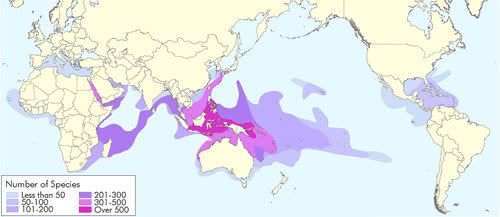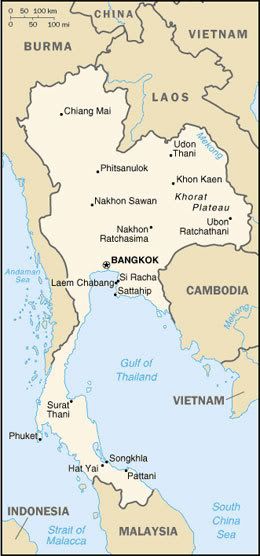An interview with Niphon Phongsuwan,
Project Leader, Green Fins Project
Phuket Marine Biological Center, Phuket, Thailand
THE GREEN FINS PROGRAMME
Thailand joins The Philippines in being actively engaged with Green Fins.
Coral reefs are an important resource in Southeast Asia, contributing to the economic incomes of the coastal population and the growing dive tourism industry in this region. The East Asian Seas region contains one of the greatest concentrations of coral reefs in the world. The area is so rich in biodiversity that more coral and reef fish species can be found here than anywhere else. The coral reefs of the region can be regarded as a classic example of a rich and diverse ecosystem.
 Map of global coral diversity from the World Resources Institute Please click to expand
Map of global coral diversity from the World Resources Institute Please click to expandThe main reason the participating countries were selected is recognition of the importance of the Indo-Pacific in terms of their contribution to global marine biodiversity. As this inevitably makes countries in the region popular dive sites, there is the risk that they will be adversely impacted by dive tourism if conservation measures are not introduced pro-actively.
To promote the protection and preservation of the marine environment, a new project called Green Fins is being rolled out in Thailand. An initiative of the Coordinating Body of the Seas of East Asia (COBSEA), United Nations Environmental Programme (UNEP), the Green Fins mission is “to protect and conserve coral reefs by establishing and implementing environmentally friendly guidelines to promote a sustainable diving tourism industry”.
With decades of sustained growth in Thailand’s economic and tourism development, the impact of human activity on coral reefs is apparent. In the past, human impact on Thailand’s coral reefs were primarily from unsustainable practices such as dynamite and poison fishing. While these factors have not disappeared altogether, the environmental impact from dive tourism is potentially of more significance now. For example, the island of Koh Tao, a diving Mecca off the coast of Chumphon Province and Thailand’s most popular diving destination for all dive beginners, accounts for approximately 30 per cent of all dive certificates issued around the world. With the large numbers of divers visiting this island and other diving hotspots, inexperienced divers, reef-walking snorkellers and underwater photographers, as well as dive boat anchors, cause direct physical damage to coral.


Images © Phuket Marine Biological Center, Phuket, Thailand
Human-induced climate change is also leading to changes in temperature and sea level which in turn are causing changes in reef communities, such as bleaching and disease. This makes it all the more important to reduce the impact people have on this fragile ecosystem.
While climate change is inevitable, minimizing the impact from tourism-related activities can be more easily achieved.
HOW YOU CAN HELPSUSTAINING THE PROGAMME
Individuals and organizations will in future be able to join a Green Fins Club. This will promote interest in the conservation of reefs.
Funding support from the private sector will help fund activities and monitoring of the programme. Ultimately the success of the programme will depend on the extent to which it can be sustained.
Green Fins can eventually become a part of official Thailand Government marine conservation programmes, and so be supported through annual budgets and sustained through forward planning.
Source Reference :www.TATnews.org Read more!Source Photo : Images © Phuket Marine Biological Center, Phuket, Thailand
*Sources
1 Tourism Authority of Thailand
2 Department of Marine and Coastal Resources








0 ความคิดเห็น
Post a Comment